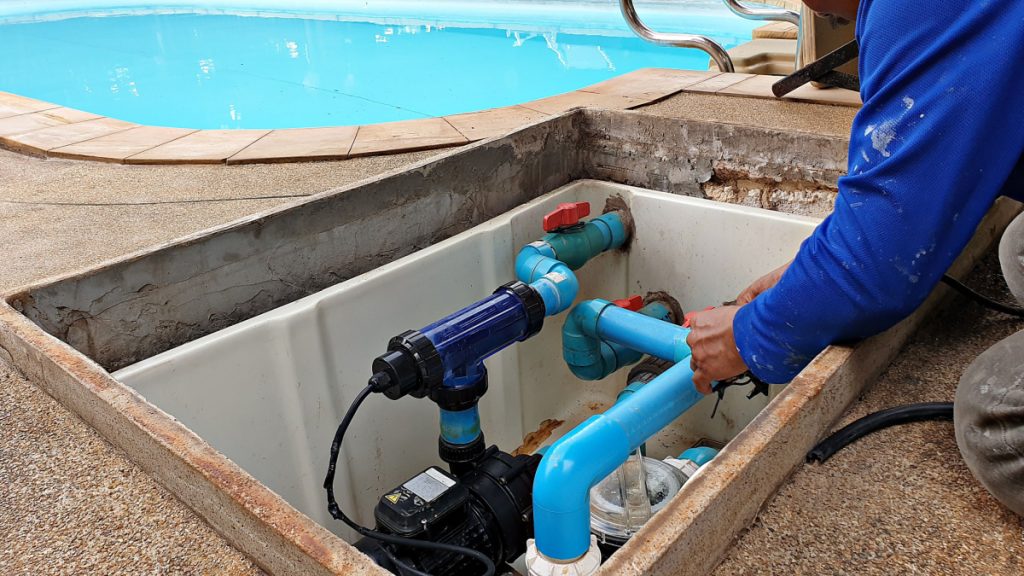Maintaining a sparkling, crystal-clear swimming pool is the dream of every homeowner. But what happens when your oasis in the backyard starts losing water mysteriously? If you’re experiencing an unexplained drop in your pool’s water level, you might be dealing with a pool pipe leak. With some DIY techniques and a bit of patience, you can save time, money, and the hassle of dealing with a persistently low water level.
Understanding the Basics of Pool Pipe Leak Detection
Before diving into the process of finding a pool pipe leak, it’s essential to know the common signs and causes of water loss. A pool losing water can be due to various factors, such as evaporation, splashing, or leaks. If you’ve ruled out the first two possibilities and your water loss continues, it’s time to consider a pool pipe leak.
Pool pipe leak detection involves identifying areas where water might be escaping from your pool plumbing. These leaks can occur in the return line, the drain at the bottom of the pool, or any part of the pool plumbing system. To begin your investigation, follow these steps:
Check the Water Level
Before performing any repairs, it’s essential to rule out evaporation as the cause of water loss. To do this, conduct a simple bucket test. Place a bucket on the top step of your pool, filling it to the same water level as the pool. Mark the water level inside the bucket and on the pool’s edge. Wait 24 hours, and then compare the two water levels. If the pool water has dropped more than the bucket’s level, it’s likely a leak.
Observe Water Loss Patterns
If the bucket test confirms a leak, the next step is to observe the water loss pattern. Is it continuous, or does it stabilize at a certain level? This observation can provide essential clues about the leak’s location.
A continuous loss suggests a high-pressure leak, often found in the pool’s plumbing system. A stabilized loss might indicate a low-pressure leak, typically originating from a liner tear or a crack in the pool structure.
Check the Pool Area
Inspect the area around your pool for any damp or wet spots. A pool pipe leak might be responsible for creating these waterlogged areas.
Turn Off the Pool Pump
To determine if the leak is related to the pool’s plumbing system, turn off all pool equipment, including pumps and filters. This will stop water circulation and help you narrow down the source of the leak. If the water loss significantly slows down or stops when the equipment is off, it’s likely that the issue lies within the plumbing system.
Perform a Dye Test
Perform a simple dye test by adding food coloring to the water in a squeeze bottle. Squirt the dye near suspected areas, such as return lines or drains, and observe if the color is pulled away. A change in the color flow can indicate a leak.
Air Pressure Testing
If you still can’t identify the source of the leak, it’s time to perform an air pressure test. To do this, plug the pool’s skimmer and return line with test plugs. Attach a pressure testing kit to the plumbing and apply air pressure. Listen for hissing sounds or watch for pressure drops, indicating a leak in the system. If you’re not comfortable doing this yourself, consider hiring a professional to conduct the pressure test.
Calling in the Professionals
While these DIY methods can help you identify some pool pipe leaks, others may be more challenging to detect. For instance, if the leak is underground or within the pool’s structure, it can be nearly impossible to find without professional assistance. That’s when you should consider contacting pool leak detection companies like LeakXperts.
We have access to advanced tools and technology that can pinpoint even the most elusive leaks. We offer specialized services such as electronic leak detection, pressure testing, and camera inspection to ensure a thorough assessment of your pool’s plumbing. With our help, you can avoid costly trial-and-error repairs and fix the issue promptly. Contact us today to schedule your pool leak services right now and enjoy your pool worry-free.

